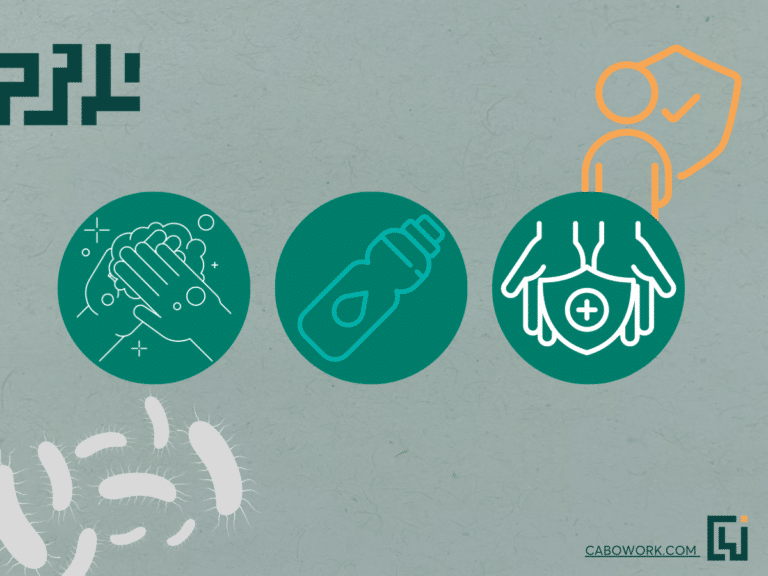Key Takeaways from This Article:
- Cape Verde is considered safe to visit. For the most up-to-date information, check your government website.
- Travellers heading to Cape Verde should wash their hands regularly, especially when visiting public areas in hotels.
- Uncooked foods, such as salads and cold meats, are more likely to carry the Shigella bacteria.
- Shigellosis has been present in Cape Verde for many years, with the most recent wave likely due in part to a huge influx of post-covid travellers.
What Is the Situation Like Now in Cape Verde?

Important Note: We regularly update this section with the most recent findings. Feel free to check back here regularly for the latest information.
Latest information on shigellosis in cape verde (February 2024):
Approximately 835,000 guests arrived in Cape Verde in 2022, a 394% increase from the 2021 figures. In comparison, the latest data shows that 258 cases of Shigellosis cases have been reported so far. The disease is still very much affecting only a tiny fraction of guests who arrive in the country.
Even so, public health authorities in Cape Verde are working closely with third parties to conduct a thorough investigation of the Shigella reports. However, the Cape Verde Public Health Institute (INSP) has stated that outbreaks of diarrhoea-related diseases have been investigated since September 2022, with no increase in cases over previous years.
Travellers to the country are advised to stick to good hygiene practices, washing hands regularly. Avoiding eating raw foods where possible is also advised.
March 2023
A comprehensive investigation has been conducted by the ECDC on Sal Island, checking for cases of Shigella infections. While the results of this investigation have not yet been released, Inforpress has been notified that the results “are negative”.
The INSP has not yet confirmed the results, stating instead that there will be a public announcement of the findings in the coming days. We can also expect disease control methods to be put forward from this study.
February 2023
Up to and including February 2023, there were 258 cases of Shigellosis with a link to Cabo Verde reported by the ECDC across 10 countries in the EU, the UK, and the US. {1} The Shigella sonnei bacteria strain also showed signs of resistance to certain antibiotics.
Based on the available information, many cases of the disease in Cape Verde are reported to have stayed in all-inclusive hotels. ECDC officials have suggested that there is a moderate risk of new infections emerging from the country.
November and December 2022
The European Centre for Disease Prevention and Control (ECDC) noted rapid reporting of Shigellosis cases throughout the EU/European Economic Area and the United States with links to Cape Verde.
What is Shigellosis?
Shigellosis is a form of dysentery, a bacterial infection that causes severe diarrhoea and fever and has been a significant public health concern in many parts of the world, including Cape Verde. At its root, the disease has been linked to poor sanitation and hygiene practices.
As with other diseases, Shigellosis has evolved and changed over the years, resulting in new variants with varying degrees of symptoms. The most recent outbreak has been linked to Shigella sonnei, one of the four known species of the Shigella bacterium.
How Is Shigellosis Contracted?
Shigellosis is most commonly contracted through oral contact with material contaminated by human faeces. This can occur through person-to-person transmission, via contaminated food or water, or through objects that have been in contact with faeces.
It has also been linked to swallowing water that you swim or play in; however, hotels should treat their pools to combat this. {2}
Food-related outbreaks are often caused by infected food handlers, who contaminate ready-to-eat food items like salads.
Who Is Most at Risk from Contracting Shigellosis?
While the disease can be contracted by anyone who comes into contact with the Shigella bacteria, there are some groups who are more at risk than others. These include:
Very young children – Those under 5 years old are at a higher risk of contracting the disease, as their immune systems are less developed than an adult’s.
People with compromised immune systems – Other illnesses, such as HIV, can seriously threaten the immune system. If this person were to be exposed to the Shigella bacteria, there may be life-threatening complications.
Pregnant women – While only a few cases of Shigellosis in pregnant women have been documented, the disease can lead to “uterine contractions and changes to the cervix” {3}, which can result in miscarriage. Pregnant women are therefore advised not to travel to countries where Shigellosis may be present.
How Can I Avoid Contracting Shigellosis?
As with all diseases, the best treatment is prevention. Here are some best practices that you can take to help prevent Shigella infection:
Keep a regular hygiene routine – Washing your hands regularly is one of the most effective ways you can prevent bacterial infections and transmission. This is especially important if you are staying in a hotel with high foot traffic.
Check the latest health and safety guidelines – Try to stay informed about the most up-to-date information about the disease in your destination country. Your local government website can be a helpful resource here.
Avoid direct contact with an infected person – If your partner has contracted the disease, avoid any form of sexual contact for two weeks after they recover from the disease, as contact during this time can still lead to transmission.
Be careful when consuming certain foods – When you are eating at a restaurant, it can be difficult to know what levels of hygiene are practised in the kitchens. To this end, we recommend sticking to reputable restaurants avoiding food which is uncooked, such as salads, cold meats, and other dishes containing raw ingredients.
What Are the Symptoms of Shigellosis?
Shigellosis is most commonly linked with watery diarrhoea (which is often bloody); however, there are a number of other symptoms which may arise, including abdominal pain, fever, and stomach cramps.
Treating a Shigella Infection
Shigellosis normally goes away within 5 to 7 days after symptoms have appeared. Take plenty of fluids to help prevent dehydration and get lots of rest.
In particularly severe cases, doctors may prescribe antibiotics to help treat the Shigella infection. Follow all instructions as advised by your doctor.
It’s important to speak to your doctor before purchasing over-the-counter (OTC) medications, as some treatments for Shigellosis have been shown to make conditions worse.




